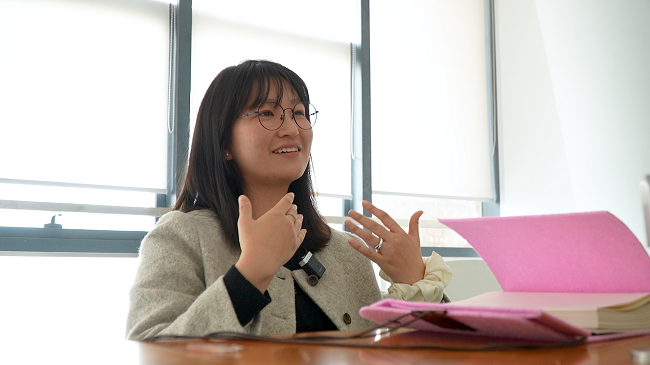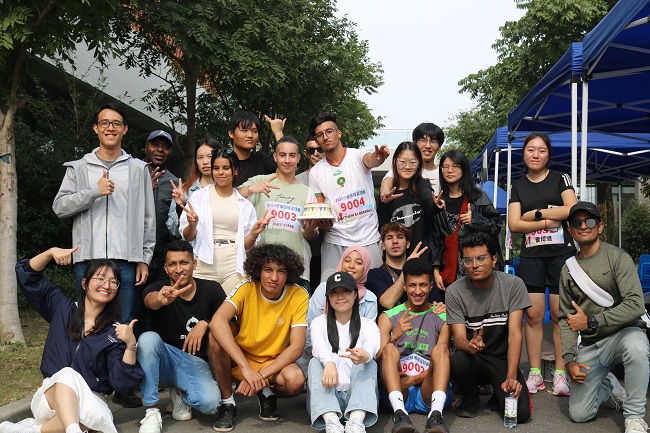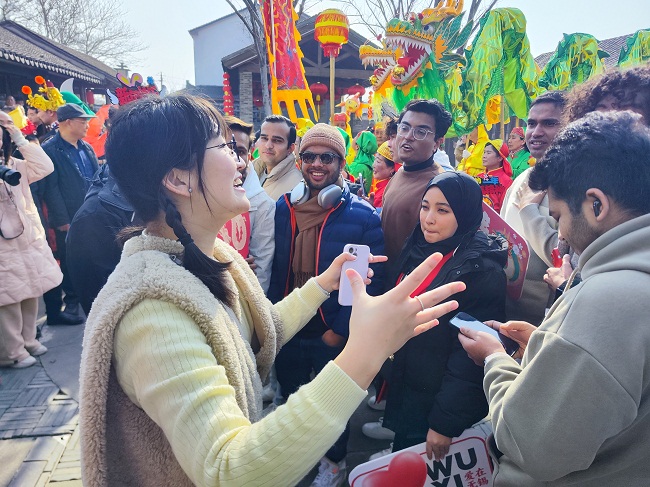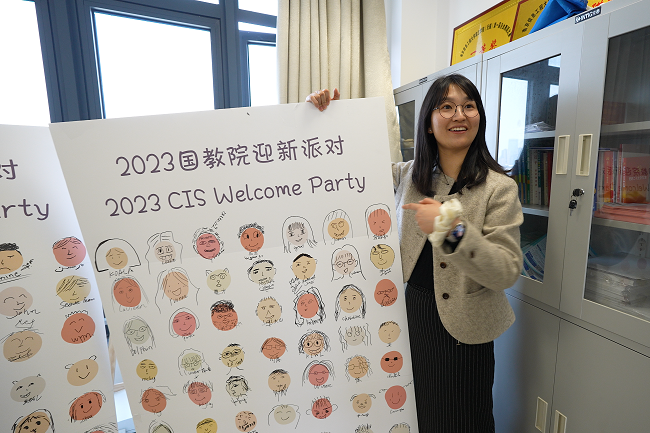grandmother

‘As long as I am here’
By Bradley Johnson(en.wuxi.gov.cn)
(Faces of Wuxi Series, vol. 1 – Cheer Laoshi)
Wuxi resident Bradley Johnson here.
I love exploring and getting to know all kinds of wonderful people in this city.
Let me tell you about Jiang Yiqi, aka “Cheer Laoshi.”

The one and only Jiang Yiqi, aka “Cheer Laoshi”. [Photo provided to wuxi.gov.cn]
Jiang Yiqi(蒋一琦)fittingly goes by the English name of Cheer. A Wuxi native, the self-proclaimed “between 18- and 30-year-old” has shared her cheerful, caring, and understanding heart with over 300 unique individuals from more than 40 different countries as Wuxi University’s international student counselor for the past 6 years.
On a recent visit to the school, when I asked a trio of her students what they typically call her, they provided me with three different answers— “Jiang Laoshi” (laoshi meaning teacher), “Cheers Laoshi” (eliciting giggles from all three), and, the name most students use, “Cheer Laoshi.”
Out of respect for popular convention, I will hereby refer to her in the same manner.

Cheer Laoshi (second from left) took me (left) on a tour of Wuxi University. Here she is showing me a collection of cards and photos from her students she keeps on the wall in her office. [Photo provided to wuxi.gov.cn]
Married to her high school sweetheart, Shen Lingxing, Cheer Laoshi is not only a beacon of support for her students in every way imaginable, but also a devoted wife and mother. Shen expressed to me his gratitude that their home, enriched by the presence of their one-year-old daughter, has become a place where Cheer Laoshi’s interactions with her students from various backgrounds are constantly applied as lessons of empathy and understanding. “Many see their jobs as a means to an end, but Cheer has turned hers into a window to a larger world,” her husband reflected.
My own first look through this window of Cheer Laoshi’s creation came more than a month ago, as I was an ancillary observer sent to report on the participation of a group of Wuxi University international students in a Spring Festival event in Yixing, a county-level city in Wuxi.

Cheer Laoshi (lower left) poses with a group of her students at a Wuxi University athletic competition in 2023. [Photo provided to wuxi.gov.cn]
Within ten minutes of hopping on the chartered bus to the event, it became clear to me that my main goal that day was to learn exactly what made her relationship with her students so special. I was both moved and amused as I observed her genuine interactions and the ease with which she related to the diverse group of 14 students.
Stationed near her at the front of the bus, I began taking notes of random snippets of the exchanges between Cheer Laoshi and the half-dozen students sitting in her vicinity. There was a discussion on the differences between Moroccan French and what is spoken in other countries. A quick Chinese language review lesson was held. Laughs were shared watching Uzbek music videos. Shakira’s Waka Waka may or may not have been danced to, seatbelts on.

When Cheer Laoshi (left) speaks, her students listen! Here, they are being entertained by her explanation of the Spring Festival traditions in Yixing, a county-level city in Wuxi. [Photo provided to wuxi.gov.cn]
Suddenly, in the midst of a rare 15-second moment of silence, Cheer Laoshi looked up from her phone. She wasn’t panicked, but she was what we’ll call warmly urgent.
“Is Fatima still here? Fatima? You’re good?”
“Yep, I’m good,” a quiet voice that we’ll describe as warmly cared-for responded from about six rows back.
On my subsequent visit to Wuxi University, I reminded Cheer Laoshi of this little exchange and invited her to comment on it. She explained that Fatima was the only girl to sign up for the trip. None of her Moroccan friends were able to come. In fact, Cheer Laoshi was surprised and impressed that the quiet freshman even showed up.
“It was her first time attending an event away from the school,” she said. “I was worried that she would feel lonely. Those thoughts just popped into my mind as I was sitting there quietly, and it was simply a natural reaction for me to call out to check on her.”

Cheer Laoshi shows off some rather spectacular self-portraits by her students which she keeps in her office. [Photo provided to wuxi.gov.cn]
As we continued our talk, I sought to glean from Cheer Laoshi yet another secret or two about how she connects so well with her students. At one point, she used phrasing that struck me as unique—if not even a bit peculiar. “These kids are very specific individuals,” she remarked, “each with very specific troubles.”
When I asked her why she chose to use the word “specific” in that way, Jiang explained, “It’s about looking at the details of a person. When we don’t pay attention to the specifics, we miss the opportunity to truly understand them.” Christian Maxwell Carter, a student from Barbados, shared with me on a separate occasion that “She is always there, creating a space where we can talk openly, which means everything, especially for someone like me who’s naturally more reserved.”
Cheer Laoshi even uses a vlog, which she created under the guidance of her social media savvy Uzbek student, Ishanov Dostonjon, to unlock new levels of trust with her students. The vlog documents her daily work and interactions with them in a personal and “specific” way. Her students love it, and she has found them even more willing than before to heed her guidance.
Indeed, “There is a very long phase of building mutual trust,” Cheer Laoshi told me. “You’ll only listen to an elder you trust.”

If Cheer Laoshi ever formed a band with her students, this could work as their first album cover. From left to right: Ishanov Dostonjon, Uzbekistan; Hilmi Ryane Lekbir, Morocco; Chai YuanFeng, Malaysia; Cheer Laoshi, China. [Photo provided to wuxi.gov.cn]
In another beautiful example of her brand of specific treatment, Cheer Laoshi recalled to me an impactful experience she had with a student back in 2018, at the beginning of her career. Noticing that one young man under her watch had been gradually losing weight and seemed depressed, she called him into her office. For the first several minutes of their talk, she struggled to get anything meaningful out of him. She felt like they weren’t connecting. He was clearly holding something back.
“I asked all the other students in the office to leave for a moment,” Cheer Laoshi told me. “I wanted to have a one-on-one conversation with him. No distractions. No other voices.”
This attentive environment enabled the student to share about a recent family loss, the root of his distress. Recognizing the need for specialized support, Cheer Laoshi approached the university’s psychological counselor. Faced with initial concerns about language barriers and a lack of precedent for international student counseling, she remained undeterred, confidently asserting, “As long as I am here, it can be done.” Cheer Laoshi told her colleague, “We are going to help this kid.”
Putting her promise into action, the teacher worked out all the needed documentation. She personally translated each therapy session. With Cheer Laoshi’s help, the psychological counselor was able to quickly work through perceived cultural and language barriers, and the young man made a successful emotional and physical turn-around.
“Language isn’t really the issue,” Cheer Laoshi explained as she reflected upon the experience. “The real issue is whether anyone is actually willing to take this path.”
This path, as Cheer Laoshi envisions, goes beyond the walls of Wuxi University. She told me she hopes that all educators, students, and members of the wider community can strive to look beyond labels for empathy and understanding.
She recognizes, of course, that the reality for her students of finding themselves quickly identified as “waiguoren,” or “foreigners” on a daily basis in China is as commonplace as it is accurate. Their appearance and mannerisms are indeed foreign. They eat different food, speak different languages, and carry different passports. It is thus understandable for their Chinese classmates and teachers to think of them first and foremost as waiguoren when they see them walking across campus.
When I mentioned the word “heroic” to describe the way she connects with her students, Cheer Laoshi laughed it off. Though she modestly brushed aside the idea, suggesting “there are too many areas where I haven’t done enough,” it’s clear that her actions speak volumes. To me, “As long as I am here, it can be done”…well, that sounds like something a hero would say.
Wuxi friends! Is there someone you think readers would like to see featured in the Faces of Wuxi series? Hit me up! [email protected]
